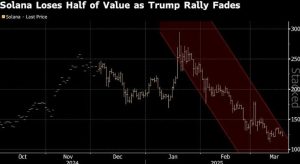
Solana’s memecoin craze is being driven by insider groups, social media influencers, and speculative tactics that reward early access and punish retail investors. Platforms like Pump.fun and Meteora fuel the frenzy.
What began as a seemingly grassroots memecoin movement on the Solana blockchain has rapidly evolved into a multibillion-dollar ecosystem shaped by private groups and insider networks. While high-profile figures like Donald and Melania Trump and Argentine President Javier Milei have recently brought attention to the space, many industry observers now view the memecoin sector as heavily manipulated — rewarding insiders while exposing retail investors to substantial losses.
The memecoin frenzy gained momentum in late 2023 with the explosive rise of Bonk Inu, Solana’s breakout meme token created in the wake of FTX’s collapse. Promoted as fun, community-driven tokens, memecoins have since become one of the blockchain’s primary growth engines. Today, most new memecoins are launched on Solana due to its low fees and fast transactions — but also because of the dense web of influencers and launch syndicates behind the scenes.
According to Jordi Alexander of Selini Capital, memecoins were initially marketed as a break from the VC-dominated utility token world. Yet in reality, they offer similar — if not greater — advantages to insiders who gain early access. Key opinion leaders (KOLs), often social media influencers, are typically offered deeply discounted tokens pre-launch in exchange for promotional support. Despite claims of “fair launch” models, true equality of access remains rare.
The risks of entering late are clear: the Trump token peaked at nearly $74 before dropping over 85%, while the Melania token has lost over 95% from its highs. Solana’s native token SOL has also seen sharp declines, reflecting broader investor caution.
Prominent figures like Dave Portnoy have admitted to being approached for early involvement in memecoin launches. Behind these campaigns are so-called “cabals” — tight-knit groups like Kelsier Ventures, Fantom Troupe, and LA Vape Cabal — that coordinate token creation, influencer partnerships, and even price manipulation through techniques like sniping, where bots buy tokens immediately at launch and dump them shortly after.
Meteora, a Solana-based DEX, has become the preferred platform for such launches, including Trump, Melania, and Libra. Tied to the broader Jupiter ecosystem, Meteora and its tools have enabled the rapid commercialization of meme assets. Internal audio leaks and investigative reports have shed light on private dealings, undisclosed relationships, and market-making tactics that skew the playing field.
Despite criticism, Pump.fun and similar platforms continue to fuel the memecoin boom. According to Animoca Brands’ Mohamed Ezeldin, much of the current activity revolves around maximizing ROI over actual utility. “It’s become a zero-sum game,” he said.
Ironically, this speculative mania may have found regulatory breathing room. In late February, SEC staff clarified that memecoins — due to their limited functionality — are viewed more like collectibles than securities. As such, they are largely outside the scope of U.S. securities laws, leaving investors without traditional legal protections.